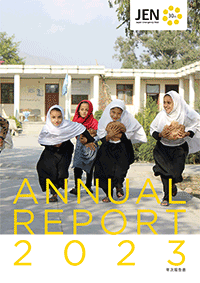Water distribution and discharge
About 80,000 Syrian refugees live in the space of less than six square kilometers, the Zaatari refugee camp.
If you just see the number of population density, there seems to be the more populated cities in the rest of the world. But you may find it difficult to simply compare the housing density when you think about the fact that all the buildings have gotten only one floor in this camp.

↑The street ‘Champs-Elysees’. A busy market with full of people for shopping.
The problem is not only high housing density but also that there are no water supply and sewage systems.
Water is supplied to the camp by rullies, and then stored in the public water tanks in everywhere in the camp, which are open for public. Refugees transfer water from these tanks to their buckets and polyethylene-tanks, and then bring them to their houses.

↑A queue waiting for water distribution.
Also, since there are no sewage water systems, domestic wastewater has been drained out of the houses without any treatment.

↑Disposed domestic wastewater disposed from the houses.
In order to solve these problems, JEN has been trying to build water supply and sewage systems with the other supporting organizations. It is clear that the refugees’ everyday life will be more convenient by building those systems. In addition, it will make a lot of differences for their life, such as:
1.to reduce their workloads to go and get water.
2.to enable to run water distribution by rullies with the lower cost by that the running cost covers only the system maintenance. Therefore, the systems will continuously work even after the supporting scale is reduced in the future.
3.to increase safety level for inhabitants –especially those who live in narrow streets– by reducing a risk of a danger caused by large rullies.
4.to reduce a noise by rullies
5.to improve of hygiene environment (such as the prevention of diseases, bad smell as well as the better landscape) by that domestic wastewater is no longer exposing on the road surfaces.
It has been three years since the camp was established. Because there is no prospect that the situation around Syria will be stable in the near future, supports from the mid and long terms point of view are essential. The development of water infrastructure is one of these efforts.
Such big projects require a huge amount of resources in terms of planning, technique and finance. While cooperating with each post and asking them for support, we have been doing everything we can do to help Syrian refugees improve their living conditions, though the steps are little by little.
【JEN is now accepting donations. Your help would be very much appreciated.
DONATE here】

![Jordan[Syrian refugees] Blog](/en/project/images/mainimg_project_jordan.jpg)




